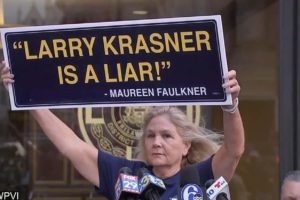Kevin Ferris, my friend and former editor at the Philadelphia Inquirer, and a cadre of other intelligent and energetic people have founded Broad + Liberty, an independent source of news and opinion for Philadelphia and the nation. This is a bold and audacious undertaking intended to offer an alternative to the mind-numbingly monotone political and social commentary purveyed by the legacy media.
Here, taken from Broad + Liberty‘s website, are the biographies of this intrepid band:
Albert Eisenberg is a rising conservative star in digital media and political communications who has been published in multiple national media outlets, including Real Clear Politics, The National Review Online, and The Hill. Albert runs a digital strategy firm based out of Philadelphia. He is a Philadelphia native and resides in Kensington.
Kevin Ferris is the co-author of two books on wounded warriors, “Vets and Pets” and “Unbreakable Bonds.” He was a commentary editor and columnist at the Philadelphia Inquirer, and his freelance work has appeared in the Wall Street Journal, Fox News Opinion, the Weekly Standard, the Washington Examiner, The Hill and the Christian Science Monitor. He lives in West Chester.
Linda A. Kerns is an attorney practicing civil litigation in Pennsylvania and New Jersey, in both federal and state courts. She is a veteran of the Pennsylvania election law scene, dedicating her time to promoting a free and fair process. She has provided commentary to radio, television, print and online media, on a variety of issues. Born in Delaware County, Linda resides in Center City Philadelphia.
Colleen A. Sheehan is Professor of Politics and Director of the Matthew J. Ryan Center for the Study of Free Institutions and the Public Good at Villanova University. She has served in the Pennsylvania House of Representatives and on the State Board of Education. She is the recipient of Earhart and Bradley Fellowships and is currently Visiting Scholar at the Benson Center for the Study of Western Civilization of the University of Colorado, Boulder. Sheehan is author of The Mind of James Madison: The Legacy of Classical Republicanism; James Madison and the Spirit of Republican Self-Government; Friends of the Constitution: Writings of the “Other” Federalists, 1787-88; and The Cambridge Companion to The Federalist (with Jack Rakove, forthcoming from Cambridge University Press). Her current projects include The World of Emma Woodhouse (an interpretation of Jane Austen’s Emma) and “Madison’s America.”
Terry Tracy is an entrepreneur with vast private sector experience and an expertise in municipal public policy and economic development. He is passionate about good government issues and advocates for fiscal restraint. Terry is a native of Delaware County and resides there with his family.
As the French would say, these are serious people, and I urge you to subscribe to their publication. It’s thoughtful, lively, free-thinking, and free.
I am honored that Kevin asked me to contribute an article with a Philadelphia angle and that Broad + Liberty accepted it for publication in today’s edition. You can access the article by clicking this link or you can read it below. As you will see, it deals with the 1981 murder of Danny Faulkner, a young Philadelphia police officer, by Mumia Abu-Jamal, a former Black Panther, and the alarming mishandling of the killer’s never-ending appeal of his 1982 murder conviction by Larry Krasner, Philadelphia’s liberal progressive District Attorney.
Krasner was elected with over $1,000,000 in financial support from George Soros. Since then, Soros has similarly funded the successful campaigns of other progressive district attorneys throughout the nation. So, even for those of you who don’t live in Philadelphia, read, heed and beware. Soros may soon go shopping for a new district attorney in your community.
Here’s the piece:
George Parry: Krasner’s handling of Mumia case part of a disturbing pattern
The trial evidence was stark and brutal. In the early-morning hours of Dec. 9, 1981, Police Officer Daniel Faulkner conducted a traffic stop in Center City Philadelphia. A scuffle ensued with the driver, William Cook.
After subduing the driver, Faulkner began to search him for weapons. It was then that Cook’s brother, Wesley, approached from behind and shot Faulkner in the back. As Faulkner fell, he managed to shoot — but not incapacitate — Wesley. Then, as the grievously wounded officer lay helpless on the cold pavement, Wesley Cook, also known as Mumia Abu-Jamal, executed him with a close-range shot to the head.
Daniel Faulkner was 25 years old.
To a multiracial jury of Philadelphians, this evidence proved beyond a reasonable doubt that Abu-Jamal was a cold-blooded killer. But, in the fever swamps of the progressive world, this former Black Panther was deemed to be a heroic political prisoner who had been framed by racist police and prosecutors.
Over the 37 years since his trial, Abu-Jamal’s conviction has been exhaustively and repeatedly challenged and appealed in the state and federal courts. Currently pending is his fifth petition for post-conviction relief. Most recently, his lawyers have filed a motion in the Superior Court requesting that consideration of that petition be remanded to the lower court for an evidentiary hearing regarding evidence that District Attorney Larry Krasner and his staff “came across” by happenstance.
According to the motion, this newly discovered evidence purportedly shows that the prosecution “promised its most important witness money in exchange for his testimony,” allowed race to “feature prominently” in jury selection, and promised leniency to another prosecution witness who was facing prostitution charges.
So, what was Krasner’s response to this motion and these inflammatory charges? None. Nada. Silence. His office didn’t even file an answer to the motion. Even worse, Krasner’s office has yet to contact Joe McGill, the homicide prosecutor who tried the Abu-Jamal case, to learn his response to the slanderous accusations aimed at him in the defense motion.
The day before the commonwealth’s answer to the motion was due, Maureen Faulkner, Officer Faulkner’s widow, was notified by email from Krasner’s office advising that it was “inclined to agree [with Abu-Jamal’s lawyers] that the case should be remanded” to the lower court. In other words, Krasner’s office waited until the eleventh hour, when it was too late for her have a meaningful say, to tell the murder victim’s long-suffering widow that the prosecution would make no response and offer no opposition to the defense motion.
(Full disclosure: I have long admired Maureen Faulkner and many years ago was privileged to provide to her legal advice that had no relationship to the Abu-Jamal case. Also, for decades I have been close personal friends with McGill, my former colleague in the Philadelphia District Attorney’s Office.)
This deliberately late notice was but one more instance of the failure of Krasner’s office to keep Maureen Faulkner advised, in a timely manner, of its handling of her late husband’s murder case, and it proved to be the last straw. The day after Krasner’s office failed to answer the motion, she filed a pro se (without a lawyer) petition to intervene in the appeal.
In her thoughtful and well-written filing, she alleges that her rights under the Pennsylvania Crime Victims Act “have been violated,” and that Krasner’s office has been unwilling to “sufficiently represent the Commonwealth’s interests in this case” and has a “conflict of interest.” She seeks the removal of Krasner’s office and the appointment of the state Attorney General’s Office to take over the case.
In support of the conflict-of-interest claim, the petition cites, among other things, (a) Krasner’s marriage to Common Pleas Judge Lisa Rau, who was a “named partner” in a law firm that once represented Abu-Jamal, (b) the employment by Rau’s old law firm of “Dana Bazelon, senior adviser to DA Krasner,” and (c) the role of Krasner’s former administrative assistant and current supervisor of Restorative Justice as “the former leader of the ‘International Concerned Family and Friends of Mumia Abu-Jamal.’”
Most tellingly, Faulkner argues in her petition that Krasner’s deal with the defense does not require the Superior Court to remand the case. In doing so she cites the decision of the Pennsylvania Supreme Court in the case of Lavar Brown, who had been sentenced to die for a 2003 murder in North Philadelphia. (It was Brown’s second murder that year.)
Shortly after Krasner became district attorney, his office — without notifying the murder victim’s family — filed a joint petition with Brown’s lawyer agreeing that Brown should be taken off death row and sentenced to life in prison. In a subsequent brief, Krasner’s office called its move to abandon the death penalty a “policy-based decision” and stated that the office saw “no reason for [the court] to expend judicial resources” reviewing the case. Krasner’s office also claimed that Brown had ineffective counsel during the penalty phase of his trial.
But the state Supreme Court was having none of it. The court rejected the argument that it was bound by the agreement between Krasner’s office and the defense. The court stated, “We note that the Philadelphia District Attorney’s Office, through the exercise of its prosecutorial discretion, actively sought and obtained a death sentence for Brown. It cannot now seek to implement a different result based upon the differing views of the current office holder [Krasner] with respect to the prior exercise of prosecutorial discretion. Elections alone cannot occasion efforts to reverse the result of judicial proceedings obtained by the prior office holder. Every conviction and sentence would remain constantly in flux, subject to reconsideration upon the changing tides of the election cycle.”
Just so. But the failed attempt by Krasner’s office to wipe out the death sentence in Brown’s case, and his office’s failure to meet its legal obligations to provide notice to the victim’s family, were by no means unique events. This is a pattern that has been repeated too many times. And it is against this background of Krasner’s indifference to the rights of crime victims, and his ongoing campaign to retroactively undo verdicts and sentences, that his office’s present and future conduct of the Abu-Jamal case must be assessed.
Maureen Faulkner’s petition to intervene may fail. But by her persistence and courage in filing it, she has brought into sharp focus the questions that continue to hang over Krasner’s head, to wit:
Whose side is he on and how much longer can Philadelphia afford to have a district attorney who has proudly described himself as “a public defender with power”?
George Parry is a former federal and state prosecutor. He is a regular contributor to The American Spectator and blogs at knowledgeisgood.net. He may be reached by email at kignet1@gmail.com.



Leave a Reply
Leave a reply.